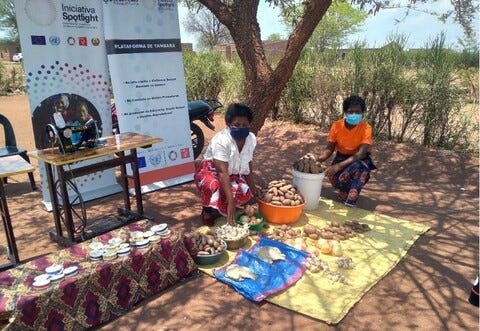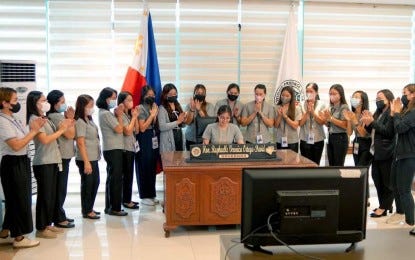Global Roundup: Iranian Film Takes on Morality & Misogyny, Support for Former Child Brides, Queer Safe Space in Jordan, 1st Indigenous Strongwoman to Gain Pro Status, Philippines Menstruation Day
Curated by FG Contributor Inaara Merani
Zar Amir Ebrahimi Photo via Vogue.
Trigger warning: violence against women
The Iranian film Holy Spider, directed by Ali Abbasi and based on the real-life case of a serial killer known as “Spider Killer” who strangled 16 sex workers, typically with their headscarves, in the holy city of Mashhad from 2000 to 2001, is creating an Oscar buzz for its lead actress Zar Amir Ebrahimi as well as highlighting the misogyny and corruption that Iran’s feminist revolution is targeting.
Ebrahimi was awarded with the best actress award at the Cannes Film Festival earlier this year for her role as journalist Rahimi who goes undercover in order to catch the construction worker who was suspected of being the serial killer.
Ebrahimi fled for France in 2008 to escape Iran’s “morality laws,” after an intimate film she made with a previous partner was leaked, a crime which is punishable in Iran by imprisonment, lashes, or stoning at times. The man who she says leaked her tape—a friend and fellow actor who did not feature in it—was sentenced to six years in prison, but was released after two months. Ebrahimi says it’s a far more lenient outcome than she would have received, despite the tape being released against her wishes. She adds that he also received public support and went on to become a celebrated actor.
When Holy Spider’s intended lead, a young Iranian actress, became fearful of acting without hijab and dropped out at the last minute, Ebrahimi proved she had enough grit and frustration to play Rahimi.
I just saw my whole life, especially my last year in Iran, on the page. I just thought she’s in me somehow, she’s not exactly me but her reasons exist inside me. - Zar Amir Ebrahimi
Abbasi says his priority was to create a film that gives women their bodies back. Iranian cinema typically censors the depiction of women without hijabs and full body coverings but Holy Spider rejects this within its opening scene as a sex worker gets ready to work.
It’s as important to see Rahimi’s toes with nail polish as it is to see what a prostitute’s life is actually like in a very religious city like Mashhad. - Ali Abbasi
The release of Holy Spider in the US comes at an important time in Iranian women’s history. As women in Iran protest for their rights, the world is watching and women around the world are joining the movement in a number of different ways. Holy Spider speaks to the lack of protections for women, queer people, and sex workers in Iran and the need for reformation and justice. The film has just been release in the US in limited theatres.
People want to change everything. They don’t just want to change something in the system, they don’t want the system anymore…A wall has broken and there’s no way back. Sooner or later, it’s going to be better. - Zar Amir Ebrahimi
Teresa Gala (left) during an activity promoted by the women's association ASMTA. Photo: UN Women/Joaquim Mendonça. Photo via Spotlight Initiative.
In Mozambique, a large percentage of young girls, between the ages of 13 to 17, have been forced to get married or live with someone as if they were married. In recognition of the lifelong issues that child marriage can inflict upon young girls – including various forms of violence, no jobs or money of their own, health issues, stigma, etc. – women’s support groups are supporting these former child brides by increasing their financial independence and equipping them with the knowledge, skills, and tools to live a secure, independent life.
In 2019, the UN Spotlight Initiative established an approach that has supported the approval and implementation of laws to protect Mozambican women and girls from Gender Based Violence (GBV) and harmful traditional practices. Although many young girls still undergo forced marriages, the Spotlight Initiative has enabled protections that did not previously exist.
The Tambara Women’s Association (ASMTA) in the Manica province is one such organization that the Spotlight Initiative has supported. Similar to other women’s organizations and groups in Mozambique, the ASMTA fosters a space where women can learn and grow together in economic spaces, creating important bonds with other former child brides. Additionally, these groups enable discussions about GBV and women’s rights.
Teresa Gala, a former child bride, is just one of over 9000 women that groups like ASMTA have helped. After joining the ASMTA, she had access to a “business kit”, which provided her with the funds that were needed to start her company selling yogurt, made with Malambe (baobab tree fruit) and Maheu (a fermented corn drink). Ms. Gala then used the profits from her yogurt to invest in a freezer to make Maheu and Malembe ice cream. She now contributes to household expenses and pays her daughter’s university fees.
My business makes me feel more respected at home. Today I am a financially stable woman, with savings, who contributes to household expenses and the education of my children. I no longer have to wait for my husband to meet my financial needs. – Teresa Gala
Madian Aljazerah Photo via Washington Blade.
In 1997, Madian Aljazerah opened Books@Cafe in Amman, the capital of Jordan. His business first began as Jordan’s first-ever internet cafe. As a gay man, Aljazerah created the coffee shop as his own safe space, but it later evolved into a safe space for the country’s LGBTQ+ and intersex community.
Books@Cafe opened in 1997. It was my “mirror,” so to speak, as it regurgitated queer culture. I subconsciously made it my safe space and then almost automatically it became the safe space for everyone else who was queer in Amman. I always hired easy going and different people … LGBT people when I could, and many refugees as well. – Madian Aljazerah
Although homosexuality is no longer criminalized in Jordan, the queer community in Jordan continues to experience legal challenges and social stigma.
Arab culture on its own is diverse from the Arabian Peninsula to the Levant. Sex is not talked about publicly and due to invasions, colonization and the oppression of Arabs, a delay in sexual social evolvement has happened. Islam became politicized and taken over from the people and our women were suddenly covered with hijabs, amongst other oppressive acts. So, our approach to change should take all of this into consideration. - Madian Aljazerah
Angela Houle painted a red handprint across her face to represent Missing and Murdered Indigenous Women and Girls during the competition. (Submitted by Angela Houle). Photo via CBC News.
Angela Houle, from Whitefish Lake First Nation in northern Alberta, recently became the first Indigenous woman to receive her pro card after competing in a strongwoman competition. This pro card grants athletes professional status, thereby allowing them to compete in international competitions.
I worked so hard for it. I couldn’t believe how I felt. It was like a spiritual moment for me…I wanted it not just for me, but for our kids, our Indigenous youth. – Angela Houle
Houle had to compete against five other women to gain pro status; she competed in an axle press, a circus dumbbell and sandbag carry, and more, commenting that this competition was the best she had ever performed.
Houle uses her platform as a strongwoman to bring awareness to issues experienced by Indigenous youth and women. During her competitions, she wears moccasins to remain connected to her people and a red hand painted over her face to advocate for Missing and Murdered Indigenous Women and Girls (MMIWG).
The first Indigenous strongman in Canada and a relative of Houle’s, Colten Sloan, has been training with Houle, and the two will attend the Arnold Classic together next year. The pair have spoken about how powerful it has been to take on these roles together as they represent themselves, their families, and the Indigenous community at these competitions.
Employees of the provincial government of La Union look on as Governor Raphaelle Veronica Ortega-David (seated) signs Executive Order 25 for the Menstruation Day privilege . Photo via PNA.
The provincial government of La Union, in the Philippines, recently announced the creation of the “Menstruation Day” privilege, providing menstruators with the opportunity to work from home during heavy period cycles. All menstruators are impacted by their periods differently, but everyone still has to attend school, go to their jobs, and live life as if there is no pain; this privilege will provide that opportunity to menstruators who need the time to recuperate, and focus on themselves, without compromising their work.
I hope that with this EO, we can spread awareness and be kinder to our female employees, especially during their period days. - Governor Raphaelle Veronica Ortega-David
The new government order will offer menstruators two days per month to work from home if needed. In addition, the provincial government will also be providing menstrual kits in every office so that menstruators are equipped to deal with their periods while in their place of work.
Inaara Merani (she/her) recently completed her Masters degree at the University of Western Ontario, studying Gender, Sexuality, and Women’s Studies with a specialization in Transitional Justice. In the upcoming years, she hopes to attend law school, focusing her career in human rights law.
Inaara is deeply passionate about dismantling patriarchal institutions to ensure women and other marginalized populations have safe and equal access to their rights. She believes in the power of knowledge and learning from others, and hopes to continue to learn from others throughout her career.







